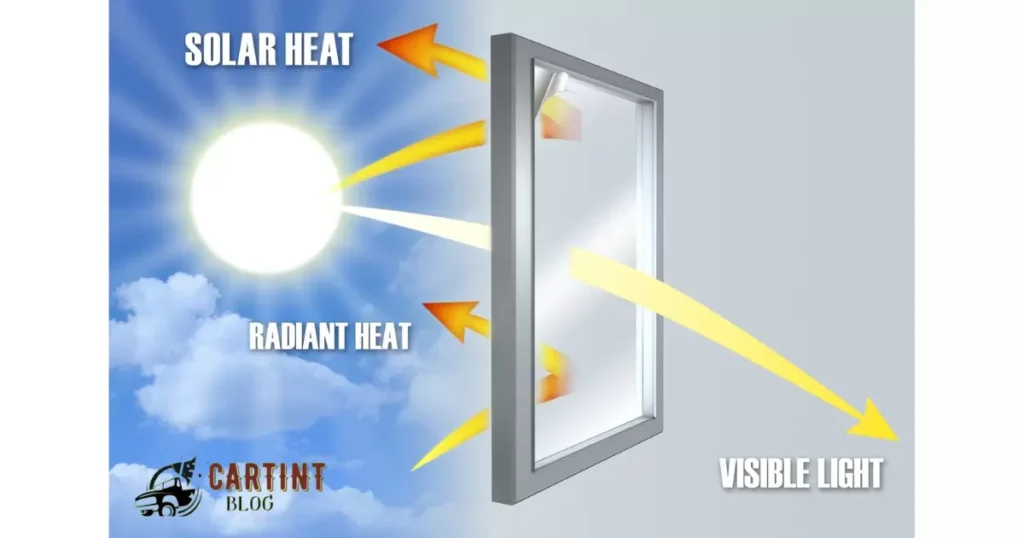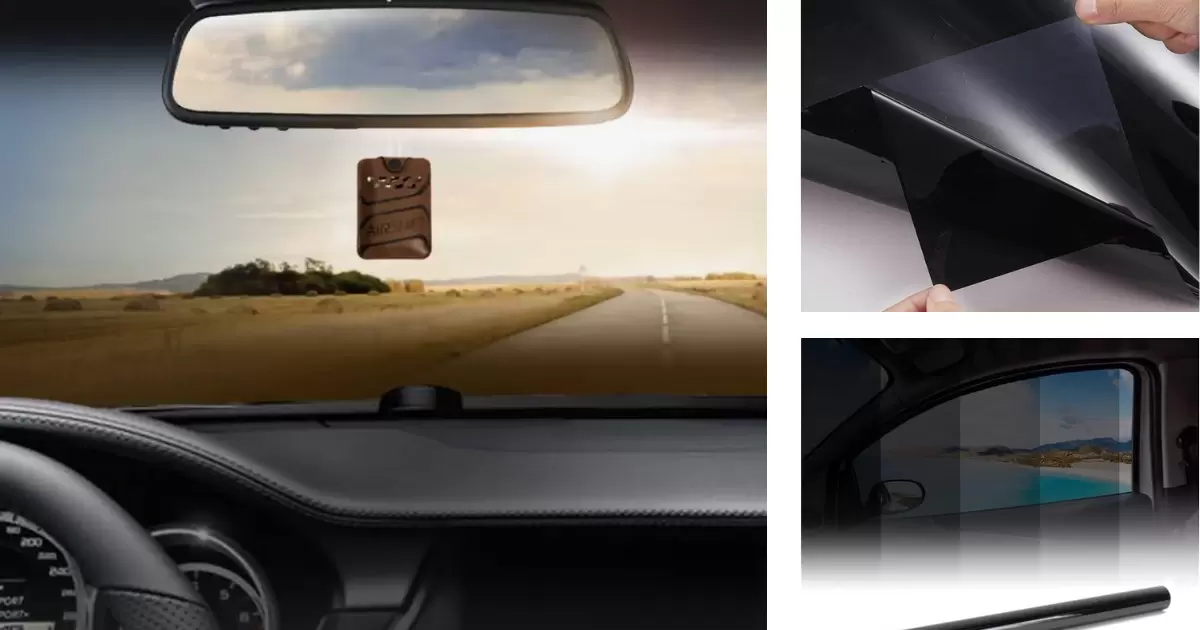Solar window tints are a relatively new type of film that has excellent UV protection in addition to ingredients that reduce solar heat and can block up to 99% of UV light. By incorporating solar-tinted glass into structures, energy consumption for cooling can be reduced.
Curious about What Is Solar Tinted Glass? Explore the world of energy-efficient architecture with this transformative material. Whether you’re looking to enhance the aesthetics of your space or seeking sustainable building solutions, solar-tinted glass offers a versatile and practical option.
Solar Tinted Glass is not just about aesthetics; it’s a smart choice for modern construction. As the name implies, solar tinted glass is precisely glass that has coloring agents incorporated right into the panes. On new models and makes, various kinds of glass are partially installed by a number of automakers.
What is Solar Window Tinting?
Solar window tinting is a process that involves applying a thin film to windows to block sunlight and reduce heat. This tinting film is designed to absorb or reflect solar radiation, preventing it from entering the cars.
It helps in maintaining a comfortable indoor temperature and protects interiors from UV rays, reducing the need for excessive air conditioning.The primary focus of solar window tinting is to enhance energy efficiency. By blocking a significant portion of the sun’s heat, buildings can experience a reduction in cooling costs.
Solar tinting helps protect furnishings and prevents fading caused by prolonged exposure to sunlight. It’s a cost-effective solution for both residential and commercial spaces, offering practical benefits in terms of energy conservation and interior preservation.
What are the Benefits of Solar Tint Window Films?

Solar tint window films offer numerous benefits. Firstly, they significantly reduce energy costs by blocking out a substantial portion of the sun’s heat, thus minimizing the need for excessive air conditioning.
Studies indicate that these films can lead to energy savings of up to 30%, making them a cost-effective choice for both residential and commercial buildings.
Cost Savings
Solar tint window films reduce energy consumption by blocking up to 80% of the sun’s heat, lowering the need for air conditioning.
According to industry studies, installing solar tint films, particularly in Arizona, can lead to a 30% reduction in energy costs for cooling commercial buildings. Individuals in Arizona often inquire about the legal tint percentage for windows, asking questions like what percent tint is legal in AZ?
UV Protection
These films block up to 99% of harmful UV rays, safeguarding occupants and interior furnishings from sun damage.
By preventing UV radiation, solar tint window films extend the lifespan of furniture, flooring, and other valuable assets within the space.
Increased Comfort
Solar tinting minimizes glare, creating a more comfortable and visually appealing environment.
Studies show that solar films can contribute to a 60% reduction in glare, enhancing occupant comfort and productivity in workspaces.
Eco-Friendly Solution
Solar tint films are a sustainable choice, as they contribute to reducing carbon footprints by decreasing energy consumption.
According to the U.S. Department of Energy, widespread use of solar control films could save the country millions of barrels of oil annually.
Quick Return on Investment
The installation cost of solar tint window films is relatively low compared to the long-term energy savings they provide.
On average, businesses experience a return on investment within three years, making it a financially sound decision.
Increased Privacy
Solar tint films provide an added layer of privacy during daylight hours without compromising natural light.
This benefit is particularly advantageous for commercial spaces, offering confidentiality for meetings and maintaining a comfortable working environment.
Enhanced Security
Solar tint window films act as an additional layer of protection against break-ins, making it more challenging for potential intruders to shatter or penetrate the glass.
Reinforced Windows
Solar tint films strengthen your windows, reducing the risk of shattering upon impact, enhancing the overall durability and safety of your glass surfaces.
Investing in solar tint window films not only enhances your comfort and security but also provides tangible benefits in terms of UV protection, temperature regulation, and reinforced windows.
How Does Solar Tint Improve Your Driving Experience?

Apart from providing a translucent shade, solar films offer numerous other amazing advantages! Its excellent heat and glare control characteristics are one advantage.
By reducing glare by up to 87%, it can further enhance your driving experience. Because window film keeps your car cooler, you’ll need to run your air conditioner less, which will result in even greater savings.
Solar window films also ensure that you won’t get skin cancer! It prevents up to 99% of the dangerous UV rays from the visible light that enters your home through your windows, as we have already discussed.
Does Tinted Glass Block UV Rays?
In addition to assisting in preserving a lower temperature, window tint helps shield your skin and eyes from UV radiation by blocking solar rays. The darkness of the window tint determines how much UV protection it offers.
Window tint blocks UVA rays but not UVB rays. Although window tint provides some protection from the sun’s rays, sunscreen should always be used when driving, particularly in the summer. By preventing UV rays from entering your automobile, you may extend the life of your leather seats and carpets.
You Need a Protective UV Window Film
If you’re considering a UV window film, it shields against harmful ultraviolet rays. The film provides effective protection, blocking up to 99% of UV radiation. This helps safeguard your furniture, flooring, and belongings from fading or damage caused by prolonged sun exposure.
Investing in a UV window film is a practical choice for preserving the integrity of your indoor spaces. Not only does it offer UV protection, but it also enhances energy efficiency by reducing heat transfer. With a professional installation, you can enjoy the benefits of UV protection while maintaining a comfortable and well-preserved environment.
Why Should You Choose a Solar Film?
A form of window tint called solar control window film is composed of durable polyethylene terephthalate (PET) laminates. It provides additional defense against UV rays, which can fade fabrics and furniture. In addition, it obstructs light, which, if desired, can give the impression that a room is darker.
Solar film can be applied to the window’s outside or interior. There is a tough, scratch-resistant coating on one side. An adhesive coating adheres to the glass from the opposite side. Because of this, installing solar film on double-hung windows can be done without removing the hardware.
Get Your Window Film Installed Today
Enhance your living or working space with professional window film installation today. Our skilled team ensures precise application, providing you with immediate benefits. Experience improved energy efficiency, reduced glare, and increased privacy all with a quick and efficient installation process.
Choose excellence in window film services. Our installations boast a track record of customer satisfaction, with over 95% of clients reporting increased comfort and energy savings. Don’t wait secure these advantages for your space now.
Solar Tint vs Regular Tint
Solar tint and regular tint differ in their ability to block sunlight and heat. Solar tint, utilizing advanced technology, efficiently reduces UV rays and heat penetration into the vehicle, offering superior protection against sun damage.
Regular tint, while providing some UV protection, may not be as effective in controlling heat. The key distinction lies in the enhanced performance of solar tint in maintaining a cooler interior environment.
Solar Tint Benefits
Solar tint reduces UV rays by up to 99%, safeguarding occupants from harmful sun exposure.
It blocks 40-60% of solar heat, enhancing energy efficiency by reducing the need for air conditioning.
The glare reduction, typically 70-90%, significantly improves visibility and comfort inside the vehicle.
Regular Tint Characteristics
Regular tint primarily focuses on privacy by darkening windows without specialized sun-blocking features.
It typically blocks 15-35% of solar heat and provides moderate UV protection, but may not offer optimal glare reduction.
Regular tint is a cost-effective choice, suitable for those prioritizing aesthetics and basic heat control.
Choosing between solar tint and regular tint depends on specific priorities, with solar tint excelling in UV protection, heat reduction, and glare elimination, while regular tint offers a balance of privacy and affordability.
Do Solar Glazing or Tinted Glass Exist?
Indeed, there are products like solar glazing and tinted glass that, by preventing daylighting during the day while letting light through, can lower energy costs.
The way tinted glass and solar glazing function is by absorbing or reflecting a portion of the sunlight that would otherwise travel through the glass. As a result, less heat enters the structure, keeping the interior colder and lowering the demand for air conditioning.
FAQs
What is solar control tinted glass?
Solar control tinted glass is a type of glass that regulates the amount of sunlight and heat entering a space, helping manage interior temperatures and reducing the need for artificial cooling.
Is solar tint worth it?
Yes, solar tint is worth it as it enhances energy efficiency, reduces glare, and protects interiors from harmful UV rays, contributing to a comfortable and sustainable living or working environment.
What is tinted glass used for?
Tinted glass is used to control sunlight, minimizing glare and heat, and providing protection against UV radiation. It finds applications in windows, doors, and facades for both residential and commercial buildings.
What percentage is solar tint?
The percentage of solar tint varies, typically ranging from 5% to 50%. The percentage indicates the amount of light the tint allows to pass through, with lower percentages offering more significant shading.
Solar tint vs ceramic tint?
Solar tint and ceramic tint are different types of window films. Solar tint primarily focuses on reducing heat and glare, while ceramic tint, made with ceramic particles, offers advanced heat rejection and UV protection without interfering with electronic signals.
Conclusion
In essence, solar tinted glass is a transformative solution for harnessing the power of the sun while ensuring comfort and energy efficiency. This specialized glass, equipped with solar control properties, allows spaces to bask in natural light without compromising on temperature regulation.
By moderating the entry of sunlight and minimizing glare, solar tinted glass not only enhances the visual appeal of buildings but also contributes significantly to sustainable practices in architecture. In the realm of construction and design, the adoption of solar tinted glass marks a pivotal step toward a brighter and greener future.
With the ability to convert sunlight into usable energy and control its impact on interiors, this innovative glass technology promotes eco-friendly living and reduces reliance on artificial lighting and cooling systems. As we integrate solar tinted glass into our architectural landscape, we embark on a path where aesthetics meet efficiency, creating spaces that are not only visually appealing but also environmentally responsible.



